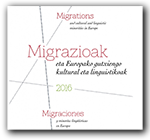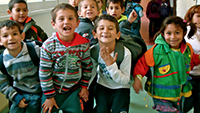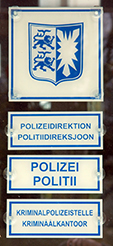Mercator Network Newsletter 122
 |
|||||||||||||||||||||||||||||||
Number 122 - May 2016 |
|||||||||||||||||||||||||||||||
| The Mercator newsletter informs you about the news of the five Mercator Network partners: | |||||||||||||||||||||||||||||||
| Mercator Research Centre of the Fryske Akademy | |||||||||||||||||||||||||||||||
| Mercator Media | Mercator Legislation / CUSC-UB | ||||||||||||||||||||||||||||||
| Stockholm University | Research Institute for Linguistics | ||||||||||||||||||||||||||||||
| Newsletter focusing on multilingual regions dealing with regional or minority languages, but also immigrant languages and smaller state languages, with emphasis on language needs arising from migration and globalisation. Submit your subscription request, comments or suggestions to: Johanneke Buning (Fryske Akademy). | |||||||||||||||||||||||||||||||
| LearnME White Paper available in Hungarian sign language | |||||||||||||||||||||||||||||||
| Mercator at Bilbao conference on migration and linguistic minorities | |||||||||||||||||||||||||||||||
| NPLD meets at Bilbao, two Mercator colleagues elected on the NPLD steering committee | |||||||||||||||||||||||||||||||
| Council of Europe publishes reports for Serbia and Slovakia | |||||||||||||||||||||||||||||||
| 18-20 May R-atics Conference in Ljouwert, Frisia | |||||||||||||||||||||||||||||||
| Troadec for president, demands “official status” for “regional languages” in France | |||||||||||||||||||||||||||||||
| All new sign posts in North Frisia bilangual | |||||||||||||||||||||||||||||||
| Province of Fryslân involved in three Donostia/San Sebastián 2016 European Capital of Culture projects | |||||||||||||||||||||||||||||||
| News from Mercator Research Library | |||||||||||||||||||||||||||||||
|
|
|||||||||||||||||||||||||||||||
LearnME White Paper available in Hungarian sign language
By: Jorrit Huizinga The LEARNMe White Paper on Linguistic Diversity has been made available in Hungarian Sign Language. This does not only make the document available to a large group of Hungarians, but also sets an example of the inclusion of sign(ed) languages in the valorisation of research results. The 30-minute video can be viewed on the Mercator Network website The translation has been produced by the Research Institute for Linguistics of the Hungarian Academy of Science (RIL-HAS), one of the partners in the Mercator Network. During the last years this institute has worked on projects involving the deaf and sign language, also in cooperation with the Deaf Institute of Hungary. The inclusion of sign language was also an eye-catching aspect of the LEARNMe final conference, organized by RIL-HAS in Budapest in September 2015. Some of the presentations were given by deaf experts, and the entire programme was accompanied by sign language interpreters. To many, the insight that sign language users often face the same challenges as spoken minority language users was valuable, and could lead to fruitful new cooperations in the future. |
|||||||||||||||||||||||||||||||
Mercator at Bilbao conference on migration and linguistic minorities
On May 26th, the conference Migrations and cultural and linguistic minorities in Europe was held in Bilbao. The aims of the conference were to study the impact of migratory flows on the cultural and linguistic diversity in Europe, propose policies for proper management migration and integration, and present success stories and best practices. Speakers from Wales, Catalonia, and Basque Country were present, and also Mercator colleague Cor van der Meer, who addressed the issue from an educational perspective. . Tree parties organised the conference together: Centre Maurits Coppetiers, ehuGune, and Ezkerraberri. More information about the conference is available here. |
|||||||||||||||||||||||||||||||
NPLD meets at Bilbao, two Mercator colleagues elected on the NPLD steering committee
On May 26th, the NPLD (Network to promote Linguistic Diversity) held a meeting to discuss NPLD strategy over the next years. The main theme of this year’s General Conference was media and social media in minority languages. The Mercator White Paper on Linguistic Diversity was also brought to the attention of those gathered. Every two years, the NPLD choses from its associate members new representatives for its steering commetittee. This year, among those elected, were Mercator colleagues Jarmo Lainio from Sweden, and Cor van der Meer from Frisia. Read more more about the NPLD meeting. |
|||||||||||||||||||||||||||||||
Council of Europe publishes reports for Serbia and Slovakia
Strasbourg, April 29th - The Committee of Ministers of the Council of Europe has published two new reports: one about the application of the European Charter for Regional or Minority Languages in Serbia, another about the application of the Charter in Slovakia. In Serbia, The Council of Europe’s experts welcomed the progress made over the past years in regional and minority language education, but also noted room for improvement: e.g. Serbian law states that a minority language class may only proceed if there are more than 15 pupils, but this is contrary to Charter regulations. However, the council also notes that in some cases the authorities allow classes for very few pupils. Unfortunately qualified teachers and teaching materials of sufficient quality are often lacking in these classes. With respect to Slovakia, the Council notes that, despite amendments, Slovakian law in some cases discourages or even prohibits the use of minority languages in public life. The report makes a series of recommendations to improve this situation. It underlines the need for action in the field of education: cost-cutting measures taken by the authorities known as “school rationalisation” are highlighted as they affect in particular small schools and have a disproportionate impact on minority language education.
Both Serbia and Slovakia enjoy a rich linguistic diversity. In Serbia 15 languages are mentioned in the Charter since 2006: Albanian, Bosnian, Bulgarian, Bunjevac, Croatian, Czech, German, Hungarian, Macedonian, Romani, Romanian, Ruthenian, Slovak, Ukrainian and Vlach. Read more on the Council of Europe website |
|||||||||||||||||||||||||||||||
18-20 May R-atics Conference in Ljouwert, Frisia
Why is it that children need so much time to learn to produce the "R" sound? Why is it that the R-sound, unlike other sounds, can be pronounced in over twenty different ways? And why does the location and presence of the R-sound in words vary so much among related languages? These and other questions were discussed by linguists from all over the globe, gathered during a three-day workshop in Ljouwert about "R"-sound. The Fryske Akademy organised this fifth edition of this workshop. Hans Van de Velde (Fryske Akademy), co-organiser since the first edition in 2000, comments: "De r is special because it occurs in many forms among languages, but also within languages, like in Dutch. You can show who you are with the "r-sound". For example, in Dutch a certain stature is associated with the "Gooise r", and originally the French "r" was considered very exclusive as well". Therefore the r-sound is an ideal model to study general processes of changes in language and identity" Source: KNAW website |
|||||||||||||||||||||||||||||||
Troadec for president, demands “official status” for “regional languages” in France
May 5th 2016 - "I solemnly declare myself in support of official status for regional languages in France." So declares Christian Troadec, mayor of Karaez, in one of his first commitments since he announced his ambition to become president of the French Republic. In a letter explaining why he is seeking to stand as a candidate, Troadec attaches great importance to the issue of territorial organization. The Breton mayor advocates “true regionalization” as alternative to “centralism taken to the extreme”, and giving "real powers and resources to the regions." The mayor argues those changes would benefit not only territories currently enjoying no autonomy or recognition in France -the Basque Country, Catalonia, Savoy or Occitania- but also regions such as Paris, because "autonomy would mean more democracy". Troadec, just as all other potential candidates, needs the support from 500 elected officials -including MPs, mayors and regional councilors in order to become an official candidate. As of today, the Régions et Peuples Solidaires Federation (RP&S), an alliance of pro-autonomy parties of stateless nations, has announced its support for Troadec. The presidential election will take place in two rounds, on 23 April and 7 May 2017. According to recent opinion polls, best placed candidates are Marine Le Pen (National Front), Alain Juppé (Les Républicains) and Emmanuel Macron (Socialist Party). Source: Nationalia |
|||||||||||||||||||||||||||||||
All new sign posts in North Frisia bilangual
May 2, 2016 - New signposts will display both North Frisian and German location names. This is one of the measures taken by the parliament of the German state Schleswig-Holstein on April 29th, and for which has been reserved an amount of threehundred thousand euros. Other measures include the free use of Danish, Dutch, Frisian and German when communicating with official institutions, and the possibility to subsidise daycare centres that communicate with the children in another language than German. The new measures complement the Friisk-gesäts, a law from 2004, that already greatly improved the situation for the North Frisian language. Source: It Nijs |
|||||||||||||||||||||||||||||||
Province of Fryslân involved in three Donostia/San Sebastián 2016 European Capital of Culture projects
Three Frisian institutions have joined the projects set up in the light of Donostia/San Sebastián 2016 European Capital of Culture. The educational centre Afûk has joined the Tosta Project: an exchange program for artists from small language regions. The historical and linguistic centre Tresoar is part of the Other Words project, an exchange program for writers from small language regions. And Mercator Research Centre is involved in the Hitzargiak project. The purpose of this project is to put organisations that are working on language promotion and revitalisation in contact with each other, and display online, in one place, initiatives that aim to support these languages. On 23, and 24 June, 2016 Hitzargiak has organised a conference to gather together the activists involved in reviving Europe’s languages. Many more projects, like the ones mentioned above, have been set up in the light of San Sebastian, European capital of culture 2016. For an overview visit the San Sebastian, European capital of culture 2016 website |
|||||||||||||||||||||||||||||||
News from Mercator Research Library
By: Ellie Albers Since november 2015 you may find the catalogue of the Mercator Research Centre Library / Fryske Akademy in the catalogue of Tresoar (the historical and literary centre of Fryslân). The catalogue of Tresoar is searchable by the following link: https://tresoar.on.worldcat.org/discovery The database with bibliographic data consists of more than 6500 entries, both books and articles. They deal with multilingualism in general, bilingual – and multilingual education, language learning, language policy, minority languagea and related subjects. In the catalogue, books can be recognized by the signature Merc, e.g. Merc100Gbe125 in the description of the information. A part of the library can be found in the quiet room in Tresoar, near the circulationdesk, the other part, especially books in and on minority languages are stored in the warehouse of Tresoar. Multilingualism is one of the spearheads of Tresoar. The Mercator library has her own systematic classification. You may consult Elly Albers, the informationspecialist of the Mercator Research Library for information by email ( ealbers@fryske-akademy.nl) or by phone ( 0031 58 233 6913) or go to the circulationdesk at Tresoar’s. |
|||||||||||||||||||||||||||||||
"No, machine translation is not about to break the language barrier: blog post by Charlie Custer. |
|||||||||||||||||||||||||||||||
Cambridge app maps regional diversity of English dialects: diversity in dialect words and pronunciations could be diminishing as much of England falls more in line with how English is spoken in London and the south-east. |
|||||||||||||||||||||||||||||||
|
Guidelines written by the council of Europe to incorporate languages in school curricula. |
|||||||||||||||||||||||||||||||
The Bilingual Advantage: Where Do We Go From Here?, blog post by Francois Grosjean Ph.D. |
|||||||||||||||||||||||||||||||
"Do not cut funding for Cornish language development", more than 5,000 people and over 30 MPs are petitioning the UK government. |
|||||||||||||||||||||||||||||||
| top | |||||||||||||||||||||||||||||||
|
|||||||||||||||||||||||||||||||
Trilingual Language Acquisition : Contextual factors influencing active trilingualism in early childhood / Srah Chevalier. – Amsterdam : John Benjamins Publishing Company, 2015 – isbn 9789027244055 – signature Merc100Gsla243 |
|||||||||||||||||||||||||||||||
|
|||||||||||||||||||||||||||||||
|
|||||||||||||||||||||||||||||||
|
|||||||||||||||||||||||||||||||
|
|||||||||||||||||||||||||||||||
The Routledge Handbook of Language and Culture / [ed. by F. Sharifian – London : Routledge, 2015 – isbn 9780415527019 – 522 p. – signature Merc100Gsl108 |
|||||||||||||||||||||||||||||||
|
|||||||||||||||||||||||||||||||
|
|||||||||||||||||||||||||||||||
|
|||||||||||||||||||||||||||||||
|
|||||||||||||||||||||||||||||||














